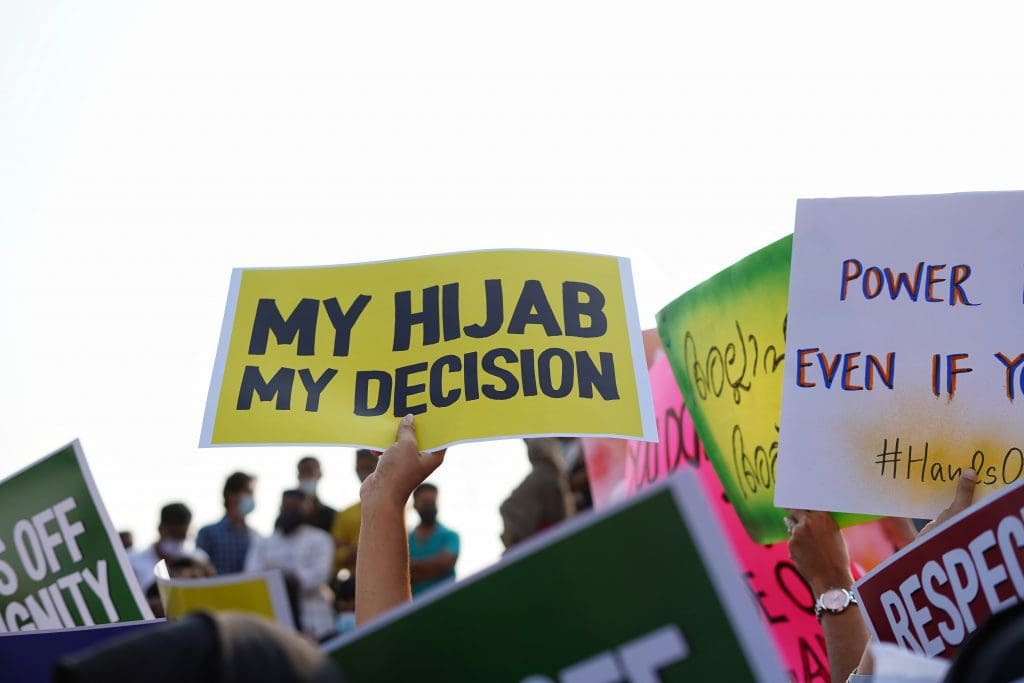
On Tuesday, over 500 lawyers, law students, and other legal professionals have strongly condemned “the violation of constitutional rights of young Muslim women who have been denied entry into educational spaces due to their wearing a hijab” in an open letter with total 765 signatories.
The legal professionals affirmed their “full and unconditional support” to the Muslim students in Karnataka protesting for their right to education and religious freedom. The law students, legal academics, and lawyers practicing in different jurisdictions of the country raise their concern about the interim order of the Karnataka High Court that imposes a blanket ban on all religious dress within the classrooms.
These professionals say they recognise the public humiliation of Muslim students and staff who were coerced to unveil on the streets to enter educational institutions as the direct result of the implementation of the interim order. The disdain for this negation of the agency of Muslim women remains the underlying tone of the open letter as it reads “this disrobing of Muslim girls and women in public view is inhuman, derogatory and an affront to the Constitution and amounts to the public humiliation of the entire community. We hang our heads in shame as having failed in protecting their basic right to life with dignity.”
While citing Amnah Bint Basheer v. Central Board of Secondary Education where the Kerala High Court decided that Hijab is an essential religious practice protected under Article 25 of the constitution, the legal professionals accentuate that “the issue at stake here pertain not only to the rights recognized in Article 25 but also more foundationally to the Fundamental Rights of the students under the golden triangle of Articles 14, 19 and 21, read with the specific protection against discrimination in Article 15.” They also stated that the denial of education merely on the grounds of wearing a Hijab is an unreasonable and disproportionate restriction on their rights. Opposing the restriction on the rights of Muslim women, they iterated that “the imposition of an absolute uniformity contrary to the autonomy, privacy and dignity of Muslim women is unconstitutional. By virtue of this women have the right to choose to wear hijab, and equally, to choose against the imposition of hijab.”
They locate the current attack on the rights of Muslim women as a part of the prevalent communal polarization not only in Karnataka but extending throughout the entire nation. Due to the alarming aggravation of religious apartheid and majoritarian violence against members of marginalized communities, the legal professionals have urged all stakeholders to appropriately contextualize the exclusion of Muslim girls in schools and colleges.
The letter reads “It must be remembered that the background within which these educational institutions have denied entry to girls wearing hijabs is one of increasing Islamophobia and violence against Muslims, including open calls for genocide, social and economic boycotts, and attacks against inter-faith couples.”
Clifton D’Rozario, National Convener of All India Lawyers Association for Justice (AILAJ), calls the situation in Karnataka a “constitutional crisis.”
D’Rozario went on to say: “The manner in which the hijab ban was suddenly introduced and the manufacturing of a communal opposition in the form of the saffron shawl campaign confirms the State government’s complicity in pushing its Hindu majoritarian agenda. At this point, when the matter reached the High Court, it was its constitutional obligation to protect society against this majoritarianism. Unfortunately, the interim order passed by the Full Bench falls short in no uncertain terms. In a sense, this order bolstered the aggression against Muslim students. There’s is no other way to understand the disgraceful, inhuman, illegal public humiliation of Muslim girls and women, students and staff, forced to take off their hijabs in full public and media glare. This situation has allowed for a new form of vigilantism to take over. Freedom for anyone to freely act on the bigotry and misogyny in their heads. Freedom to provide expression to the prejudice and bias they harbor against Muslims, without care that these are young children, adolescents, or women. The legal fraternity cannot, and should not, remain a silent bystander when the guarantees of the Constitution are openly and brazenly denied.”
Invoking the need to cultivate plurality and respect in educational institutions, the letter explicitly encourages the readers to resist the unconstitutional imposition of cultural homogeneity.
The letter conclusively quotes the apex court in Navtej Singh Johar v Union of India, “It is the responsibility of all the three organs of the State to curb any propensity or proclivity of popular sentiment or majoritarianism. Any attempt to push and shove a homogeneous, uniform, consistent and a standardized philosophy throughout the society would violate the principle of constitutional morality. Devotion and fidelity to constitutional morality must not be equated with the popular sentiment prevalent at a particular point of time”. It further calls upon all stakeholders to uphold ‘Babasaheb Ambedkar’s dream of constitutional morality.”
The members of the legal fraternity urge the Karnataka High court to “take judicial notice of public humiliation of Muslim staff and students and immediately pass necessary orders prohibiting any such derogatory practice.”
Some of the prominent signatories of the open letter are Anjana Prakash (Ex High Court judge), Amar Saran (Ex High Court judge), C.S. Dwarakanath (Ex-Chairperson, Karnataka State Backward Classes Commission), Sanjay Parikh (Senior Advocate), Mihir Desai (Senior Advocate), Ashok Agarwal (Senior Advocate), Gayatri Singh (Senior Advocate), Pratiksha Baxi (Professor and Author), Vrinda Grover (Supreme Court Lawyer), Saumya Uma (Professor), Meera Sanghamitra (Activist and law graduate), Poornima Hatti (Partner, Samvad Partners ), Shahrukh Alam (Supreme Court Lawyer), Arundhati Katju (Supreme Court Advocate) D Geetha (Labor Lawyer, Chennai) Muralidhara (Senior labor Lawyer), Arvind Narrain (Lawyer and Author), Jhuma Sen (Professor and Legal Academic), and Clifton D’Rozario (National Convener, AILAJ).



